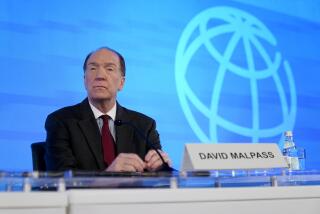Wolfowitz apologizes over girlfriend’s job
- Share via
WASHINGTON — His staff in open revolt, World Bank President Paul D. Wolfowitz apologized Thursday for his role in landing his girlfriend a job at the State Department that gave her more than $60,000 a year in raises and a salary greater than that of Secretary of State Condoleezza Rice.
“I made a mistake, for which I am sorry,” Wolfowitz said at a news conference before the spring meetings of the bank and the International Monetary Fund. He declined to answer questions about how his girlfriend’s new job and her pay had been arranged beyond saying it had been done to avoid a conflict of interest because of his position and their personal relationship. She was working for the World Bank when he became its president in 2005.
Wolfowitz suggested that his critics might be motivated in part by the role he played as an architect of President Bush’s Iraq war policy. Wolfowitz was deputy secretary of Defense before taking over the World Bank.
“In the larger scheme of things,” he said, “we have much more important things to focus on. For those people who disagree with the things that they associate me with in my previous job, I’m not in my previous job. I’m not working for the U.S. government.”
The flap is the latest at the World Bank since Wolfowitz became its president. Wolfowitz has alienated bank staffers with a management style that many regard as insular, surrounding himself with a handful of longtime associates and shutting out the staff he inherited.
Some staffers also complain that Wolfowitz intends to open a World Bank office in Iraq to channel international aid to that country, supplementing American reconstruction aid.
The pay-raise controversy stems from what he acknowledges is his romantic relationship with Shaha Ali Riza.
The bank’s multinational board of directors met Thursday to consider what to do about the matter but made no announcement afterward.
Asked at his news conference whether he would consider resigning, Wolfowitz said he would have nothing to say beyond his prepared statement.
In it, Wolfowitz said that when he came to the bank, he “raised the issue of a potential conflict of interest” because of his relationship. He said that he asked to be recused from personnel considerations regarding Riza but that the bank’s ethics committee advised him “to promote and relocate” her.
She was assigned to the State Department, where she initially worked on the establishment of the Foundation for the Future, a sort of World Bank for the Middle East and North Africa, financed largely by contributions from the U.S. and European governments, as well as rich countries in the region. After a year, she was assigned to the foundation’s staff.
Riza’s salary grew to $180,000, up from the $132,600 she had been paid at the World Bank. She recently got another raise, to $193,590, putting her ahead of the secretary of State, who earns $186,600.
“In hindsight,” Wolfowitz said, “I wish I had trusted my original instincts and kept myself out of the negotiations” over Riza’s assignments and compensation.
Riza, who carries a British passport but was born in Tunisia and is of Saudi and Libyan descent, could not be reached for comment.
Riza’s salary was disclosed not by the World Bank but by a bank employee who took the information to the Government Accountability Project, a whistle-blower protection group.
Particularly troubling to the bank’s staff were reports that Riza, while working at the bank, received fees paid by a U.S. defense contractor that was doing consulting work in Iraq.
“I know that if anyone else in the bank did this, he/she will be dismissed immediately,” said one comment on an internal bank website. The Government Accountability Project obtained and released 221 comments from the site.
The bank’s management responded to the comments’ leak and staff tumult by retaining a high-powered Washington law firm to try to find the sources. “The disclosures of confidential internal communications violated bank policy,” said a message from the legal department to the bank staff.
Bea Edwards, international director of the Government Accountability Project, said that even if Wolfowitz hung onto his job, he would find it difficult to raise funds from the bank’s member nations, one of his major jobs.
“Having demonstrated how cavalier he is in doling out money,” Edwards said, “he’ll have trouble making the case that the bank’s members should pay out more.”
In his statement, Wolfowitz said, “I proposed to the board that they establish some mechanism to judge whether the agreement reached was a reasonable outcome.” He promised to accept any recommendations it made.
The White House, which nominated Wolfowitz for World Bank president, reiterated its support for him.
More to Read
Sign up for Essential California
The most important California stories and recommendations in your inbox every morning.
You may occasionally receive promotional content from the Los Angeles Times.










